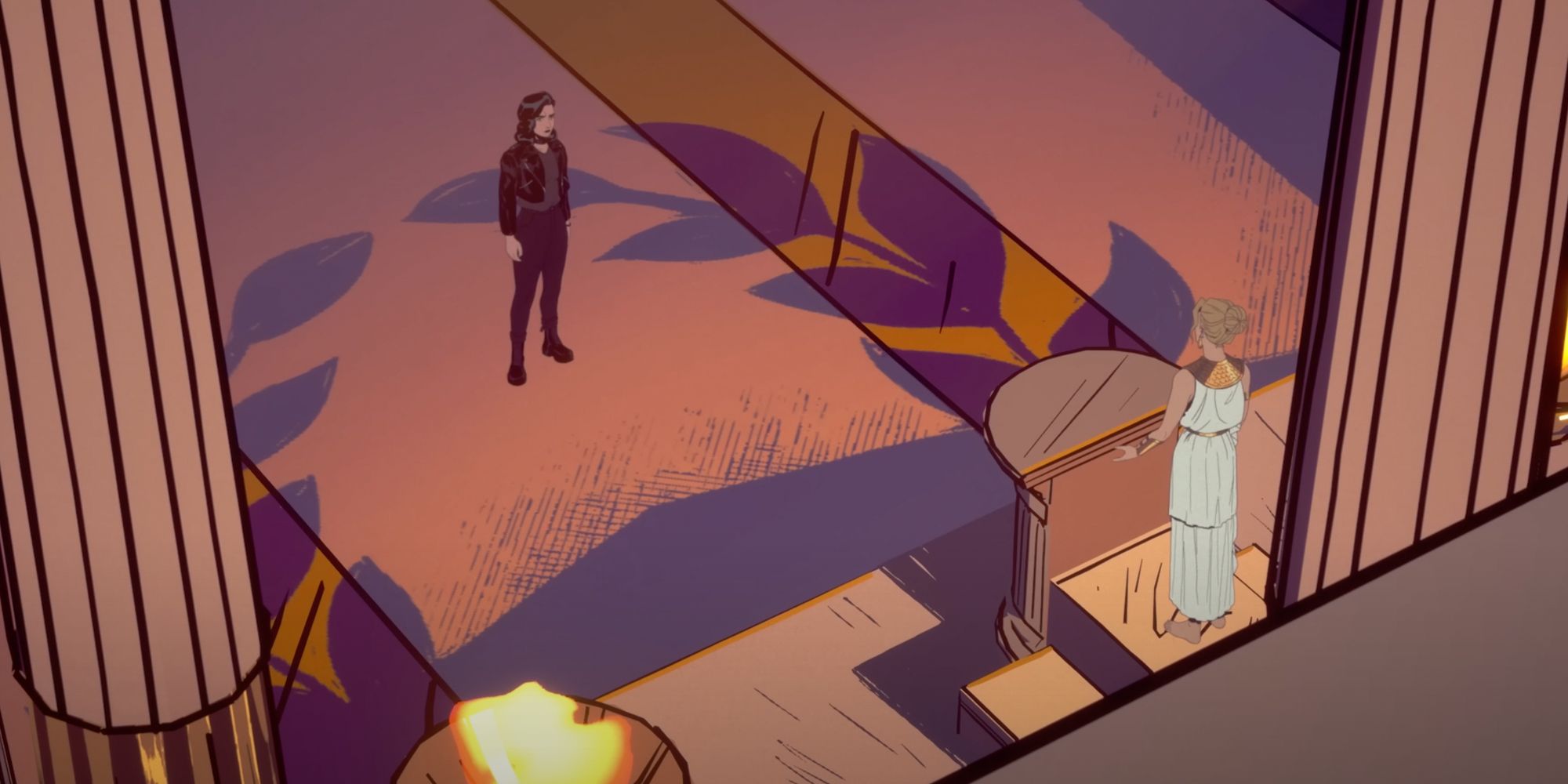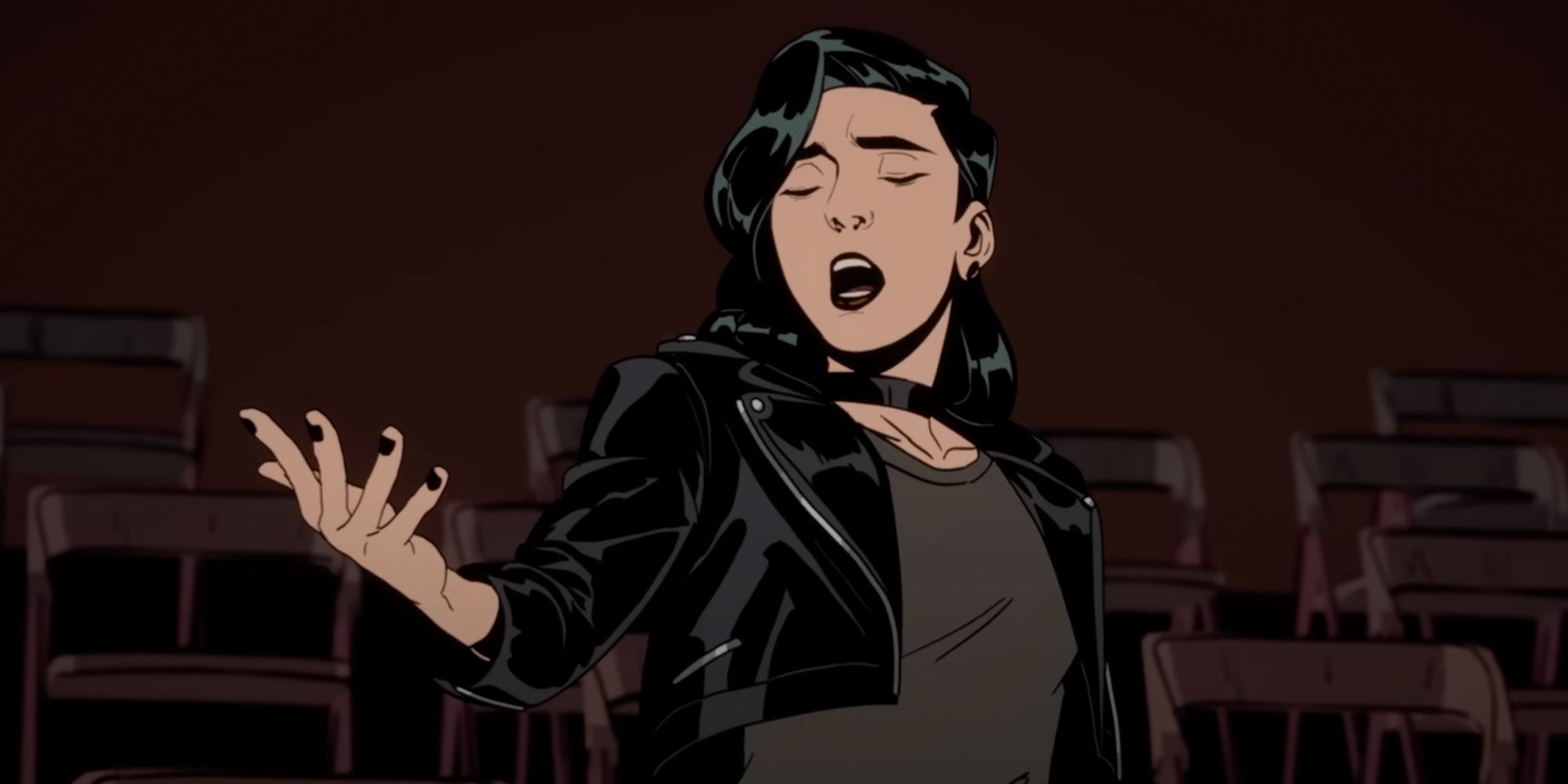What was your involvement like compared to other games that you’ve worked on, in terms of story? Because obviously, in musicals, the story is told through the songs.
Austin Wintory: When it came to the story, I wanted to ensure that the songs were never just incidental moments. In some musicals, important dialogue scenes transition into musical numbers, while in others, those crucial moments are presented as musical numbers. I insisted that for anything of major importance, we should have the courage to present it as a musical number, even though it can be terrifying and risky. To me, that’s what defines a musical.
As a result, I was involved earlier and to a much deeper level than usual. David’s storyline and script directly influenced the music, and I wanted to have a say in that. The lyricists I brought on board were also part of the discussion. We would debate when exactly a song should start in a scene, and if a line could be folded into the song to deliver it more effectively. It was an ongoing process of negotiation to find the right balance.
This extended to major character turning points as well. There were moments that we advocated for to happen in a song, which may not have occurred otherwise or would have happened differently. I want to give credit to David Gaider, our creative director, for being a generous collaborator. He involved us in the process in a way that is essential for a musical but not typical for a game.
Even just the concept of this—an interactive musical game—seems like it could get out of hand so easily in terms of the amount of work you’d have to do. How do you make it manageable when every branch theoretically leads to another branch? Are you writing new lyrics to the same melodies, and are there other tricks you had to make sure you could tackle everything?
Austin Wintory: The goal was to make your choices feel genuinely impactful and genuinely meaningful, which meant not just that the lyrics would change, but that the story could change, and that it would reveal different aspects of the personality of your character, Grace. It’s not really plot in the sense of, “What’s behind door A versus door B?” It’s about how certain things make you feel, whether it’s aggressive and antagonistic or compassionate and empathetic, or intellectual and conniving—that kind of thing. Using that as our framing device, very quickly you realize that it’s fundamentally a different story.
I ended up delivering well over six hours’ worth of raw material to the game, and we tended to average around a four-or-five-to-one ratio of material in a given song to what a player will experience on a given playthrough. rnrnAt most, you’re only hearing twenty percent of the material each time you play through the game. But don’t worry, it’s not just a jumbled mess of unrelated branches. We’ve come up with clever ways for the branches to loop back and intersect with each other, creating an interesting and replayable experience. However, this isn’t some procedural generation trick. It simply means that we’ve created a massive amount of content for you to explore.
As you were saying that, I was like, “I hope the person who edited and tuned all the vocals got a fruit basket or something.”
Austin Wintory: Yeah, well, I did the overwhelming majority of everything myself. Not because I’m the only one qualified; I was the only person that really understood all the moving parts because I was the only person that was spread across every note of music in the game. That said, your question alludes to the idea that this was also a team effort, and I could spend an hour going through the incredible team.
I’m not a lyricist; It’s one of the things that I just don’t even pretend to claim I can do because I’m very picky about lyrics, but they never seem to want to come out of me anywhere nearly as easily as music itself does. Plus, when I write songs, I enjoy collaborating with somebody to help bring a fresh point of view anyway. When the conversation turned to, “These need lyrics because that’s how we’re going to be telling this story,” I said, “There are these three guys in Australia that I’ve done this kind of stuff with before. And in addition to the fact that they’re big, nerdy gamers, they come from a musical theater background.”
They’re comedian songwriters that have a band called Tripod. They’re very witty, and they’re genuinely great songwriters. They were one of the first calls I made. Steven Gates, Simon Hall, and Scott Edgar are their names. Them being nerdy gamers, not only did they immediately get the branching idea but within the first meeting, they had already thought of ways for us to push the bar and expand on how the branching could really work. They were invaluable teammates, and it very quickly went from, “I’m just going to feed them music, and they’re going to slap lyrics on it,” to, “We are co-writing all of this, top to bottom.”
Because there’s so much content, we decided that instead of the four of us working on a song together, I split up and was writing one at a time with each of them. So, at any given moment I was writing three songs at once, and each of them was working on one.Then, we brought on a fourth songwriter named Montaigne, so I was writing four songs at once with four different collaborators.
To your question about editing vocals, we had 90-something recording sessions with the cast. Our performance director was the actor Troy Baker, who also helped us lock down this dream cast of actors, not least of which was Laura Bailey in the lead. Troy and I would direct their recording sessions together; he would direct them with their spoken dialogue lines, and then we would tag team the singing. It was six months of work; just an endless amount of recording sessions.
I brought in a friend of mine named Joris Hoogsteder, this amazing Dutch musician who I work with a lot. I elected to make him effectively my co-producer; I would send him the raw vocals and say, “I need your sanity check that this sounds good.” He became my sounding board throughout. Then, it would be like, “I’m working on the orchestration of this part, and I need to add a piano part, but I need to shift gears to work on this other song. If I described what I think it should be, would you do your own piano part for this section?” He really stepped up and did a lot in that regard.
I have other collaborators as well. My assistant Dallas had this nonstop barrage of last-second needs from me. On the Bandcamp page, when the music is eventually released, will be a rather robust list of credits. It’s always very important to me that anybody who helped have their name enshrined in the project, and it is a mighty list this time.
You touched on this, and I saw that you’ve performed some of these songs. Do you have a prime version of the narrative that’s the version that’s going to be released on the soundtrack?
Austin Wintory: It was very important to me that there not be a prime version. There are huge chunks that we poured our heart and soul into that you’ll simply never hear if you don’t open that door at that right moment. From a creative standpoint, I didn’t want to inadvertently show favoritism. So what on Earth are you supposed to do about a soundtrack album as a result? I fought through a lot of possibilities, and the one I landed on is that I’m releasing four albums.
The game has these color-coded personality traits that are what you’re choosing at every node in the song. It’s kind of like a more nuanced version of Mass Effect’s Renegade vs. Paragon or Knights of the Old Republic’s Jedi vs. Sith. Ours is the antagonistic, the compassionate, and the cerebral, intellectual kind of thing. We call them “kickass”, “clever”, and “charming”, but it’s mostly just red, green, and blue. I thought, “I can release three albums—a red, a green, and a blue—that distill every song into that version.” I suspect no one will play it that way—in fact, they’re highly encouraged not to, because the whole idea is that we want you to roleplay, and you should be responding line by line.
But it was like, “Just as a thought experiment, let’s release three albums that constitute pure red, pure green, and pure blue,” and then I thought, “I will then curate a fourth album that tries to give you an intermingling of the three.” The fourth album is a sample playthrough; it is a seemingly random plucking out of one path among the literal tens of thousands that are possible.










